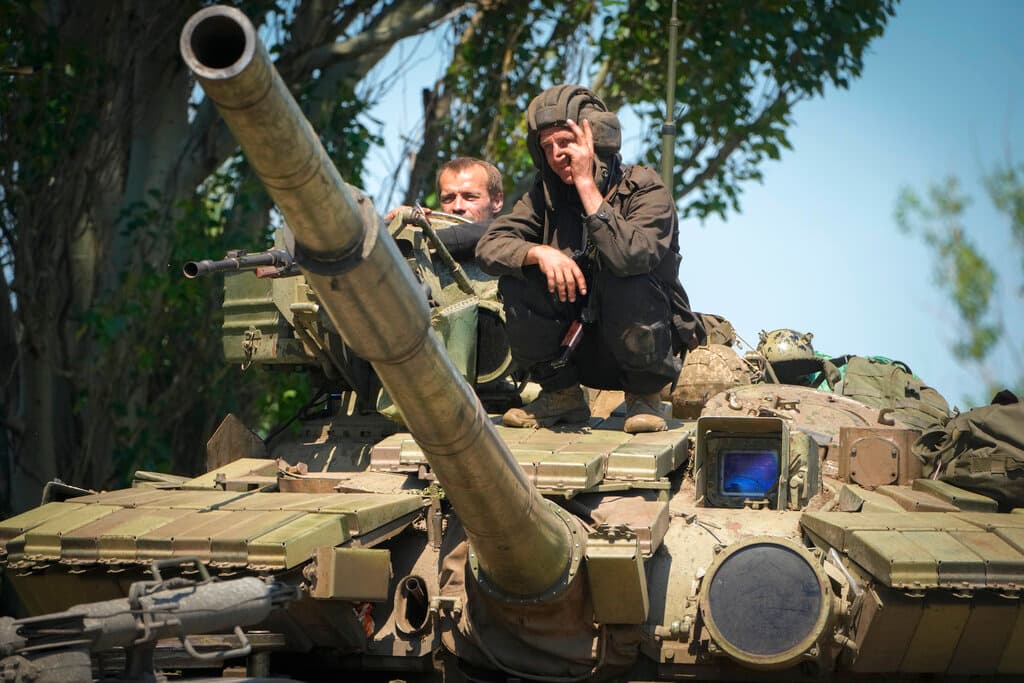Rail Ban on Goods To Support Isolated Russian Region Has Moscow Seeing Red
The powerful secretary of the Kremlin’s Security Council visited the Kaliningrad region and vowed during a national security meeting to take action over the ban.

A ripple effect of Russia’s invasion of Ukraine has spilled over to Lithuania following the Baltic country’s decision to bar Moscow from shipping certain goods by rail to its Kaliningrad exclave. The small Russian region, about 800 miles west of Moscow, is sandwiched between Lithuania to its north and east and Poland to its south and is the headquarters of the Russian navy’s Baltic Fleet. On Tuesday a top Russian security official said that the move by Vilnius will result in a response that will have a “significant negative impact” on the Lithuanian people.
The ban on goods subject to European Union sanctions was announced by Lithuanian authorities earlier this month and prompted a flurry of angry retorts from Moscow, with the Kremlin denouncing the move as unprecedented and unlawful.
The powerful secretary of the Kremlin’s Security Council, Nikolai Patrushev, visited the Kaliningrad region on Tuesday and vowed during a national security meeting to take action over the ban.
“Russia will definitely respond to such hostile actions,” Mr. Patrushev said. “The relevant measures are being drawn up in an interagency format and will be adopted shortly. Their consequences will have a significant negative impact on the population of Lithuania.”
He didn’t elaborate on what action Russia might take. Mr. Patrushev will report on the results of his trip to Kaliningrad to President Putin, his office said.
Separately, the Russian Foreign Ministry on Tuesday summoned the European Union ambassador to Russia, Markus Ederer, and “expressed a resolute protest” over the transit ban. The ministry said in a statement that it “demanded an immediate resumption of the normal operation” of the transit, otherwise “retaliatory measures will follow.”
Kaliningrad, home to more than 430,000 people, was previously called Königsberg and belonged to Germany before it was ceded to the Soviet Union at the end of World War II, when the German population was expelled. It is isolated from the rest of Russia but the two countries it borders today are members of both the EU and NATO. Trains with goods bound for Kaliningrad travel via Belarus and Lithuania; there is no transit through Poland. Russia can still supply the exclave by sea without falling foul of EU sanctions.
The Lithuanian government stressed in a written statement Tuesday that “the transit of passengers and non-sanctioned goods to and from the Kaliningrad region through Lithuania continues uninterrupted,” and that the ban on transit of sanctioned goods was merely part of the fourth package of EU sanctions against Russia. The BBC reported that the regional governor, Anton Alikhanov, said the ban would cover around half of the items that Kaliningrad imports.
Top Lithuanian officials decried Russia’s reaction to the measure as an attempt by the Kremlin to wind up a propaganda campaign trying to create an image of a “blockade” mainly for internal consumption.
The Lithuanian defense minister, Arvydas Anušauskas, tweeted Monday that “European countries may continue to be intimidated by Russia” … but “let’s not lose the ability to separate disinformation and propaganda from real possibilities.”
The country’s prime minister, Ingrida Simonyte, rejected claims about the blockade of Kaliningrad as a product of Kremlin propaganda.
“It’s just that EU sanctions have come into force on some of the goods included in the package, namely steel and ferrous metals. The transportation of all other goods that are either unsanctioned or not yet subject to sanctions is continuing, as is the transit of passengers” she said, noting the irony behind Russia’s references to international treaties.
“I don’t know if there’s any international treaty left that Russia hasn’t violated yet,” Ms. Simonyte said.
The ratcheting up of bellicose language from the Kremlin may be because, as the Guardian reported, “it is a better narrative for the Kremlin than that of Moscow blockading Ukrainian ports and creating a global food crisis that could kill millions of people.” The newspaper also reports on worries in the EU that Mr. Putin could mount an attack across the Suwalki Gap, a 50-mile strip of Polish and Lithuanian border land situated between Kaliningrad in the west and Belarus to the east. Such a move, though unlikely, “could cut off Lithuania and Latvia, which are north of the gap, from Poland and the rest of the EU south of it.”
The strategic value of Kaliningrad is not lost on the Kremlin. In addition to housing the Baltic Fleet, Moscow also parks a number of Iskander hypersonic missiles in the exclave — facts on the ground that are not lost on NATO, either.
